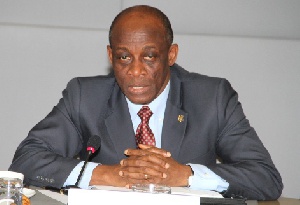 Seth Terkper, Minister of Finance
Seth Terkper, Minister of Finance
Finance Minister, Seth Terkper has disclosed that the Bank of Ghana will soon set up an apex bank for the microfinance sector to help safeguard depositors’ funds.
Speaking to the B&FT in parliament, the Finance Minister said: “The study is ongoing and may result in a legislation like the Deposit protection bill, coming to the floor of the house.”
The Bank of Ghana has already initiated a number of reforms aimed at ensuring that the financial system remains strong and stable.
To this end, a number of bills are under consideration in the legislature. These include: the Banks and Specialised Deposit-Taking Institutions bill as well the New Bank of Ghana (Amendment) Act 2015, which is yet to come to Parliament.
Apex banks essentially, mobilise deposits/funds from customers and provide lending to others who might need such funds for productive business ventures or other purpose.
The management of rural banks also ensure that they create shareholder value when performing their role as financial intermediaries.
Analysts have indicated that the consistent growth in size and numbers of micro finance institutions clearly exposed the inability of commercial banks to satisfy the loan and credit requirements of many businesses and individuals.
The BoG has reportedly announced for the information of banks, investors and the general public important changes affecting the issuing and trading of Government of Ghana (GOG) securities.
The changes are aimed at strengthening the primary dealership system, facilitating the development of the fixed income market and creating a favourable environment for private sector investors to make and realise their investment decisions.
The central bank said with effect from July 1, 2016, only financial institutions licensed by the Securities and Exchange Commission and appointed by Bank of Ghana as Primary Dealers (PDs) would participate at the wholesale primary auction to purchase GoG securities for their own account and for trading purposes.
The Bank of Ghana had recognized the major impact of microfinance on the economy, and it is estimated that they are providing for its operation under the Non-Bank Financial Institutions (Act 774) in 2008, hence, 228 licensed institutions contribute a capital of over GH¢407 million to the economy.
Mr Stephen Amegashie, the head of Governor’s department at BoG, had said at a workshop that in order to deepen the foreign exchange market and promote its smooth functioning, is putting modalities in place to surrender portions of the export receipts from cocoa and gold directly to the banks in the second half of 2016.
He said: “Previously export proceeds from cocoa and gold were surrendered to the Bank of Ghana (BoG). The BoG then sold to the banks as and when they need arises.
“Now, from the second half of the year, the programme is that the foreign exchange will go directly to the banks without going through the central bank. Whoever earns the forex will have access to it and sell it on the inter-bank market. The same will apply to the cocoa proceeds.”